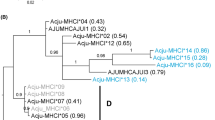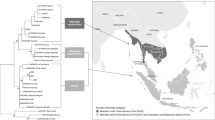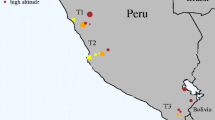Abstract.
Gene conversion and balancing selection have been invoked to explain the ubiquitous diversity of the antigen-presenting proteins encoded in the vertebrate major histocompatibility complex (MHC). In the present study, direct evidence for over-dominant selection promoting MHC diversity in primates is provided by the observation that, in a large free-ranging population of rhesus macaques, males heterozygous at MHC class II locus Mamu-DQB1 sired significantly more offspring than homozygotes (the male-specific selection coefficient s equals 0.34). This heterozygote advantage appeared to be independent of the actual male Mamu-DQB1 genotype. No similar effect emerged for a captive group of monkeys of similar genetic background but under veterinary care.
Similar content being viewed by others
Author information
Authors and Affiliations
Additional information
Electronic Publication
Rights and permissions
About this article
Cite this article
Sauermann, U., Nürnberg, P., Bercovitch, F. et al. Increased reproductive success of MHC class II heterozygous males among free-ranging rhesus macaques. Hum Genet 108, 249–254 (2001). https://doi.org/10.1007/s004390100485
Received:
Accepted:
Issue Date:
DOI: https://doi.org/10.1007/s004390100485




